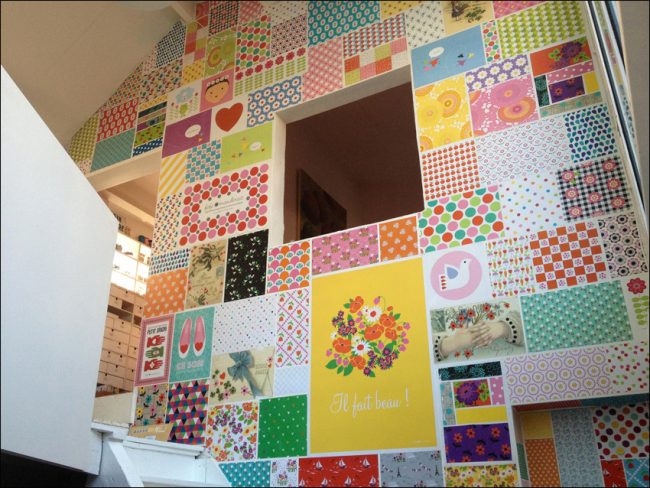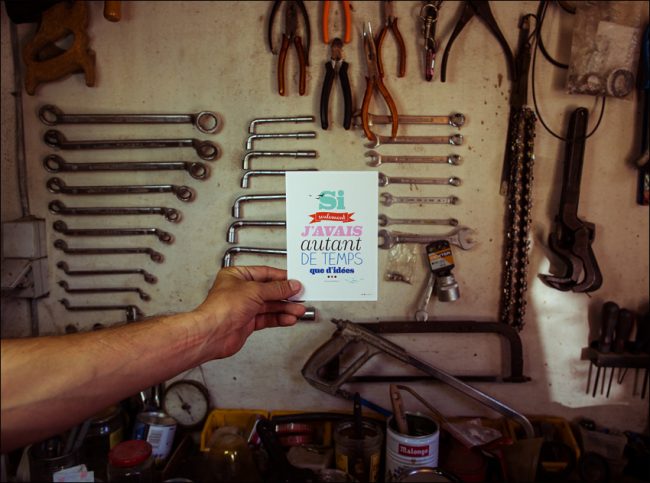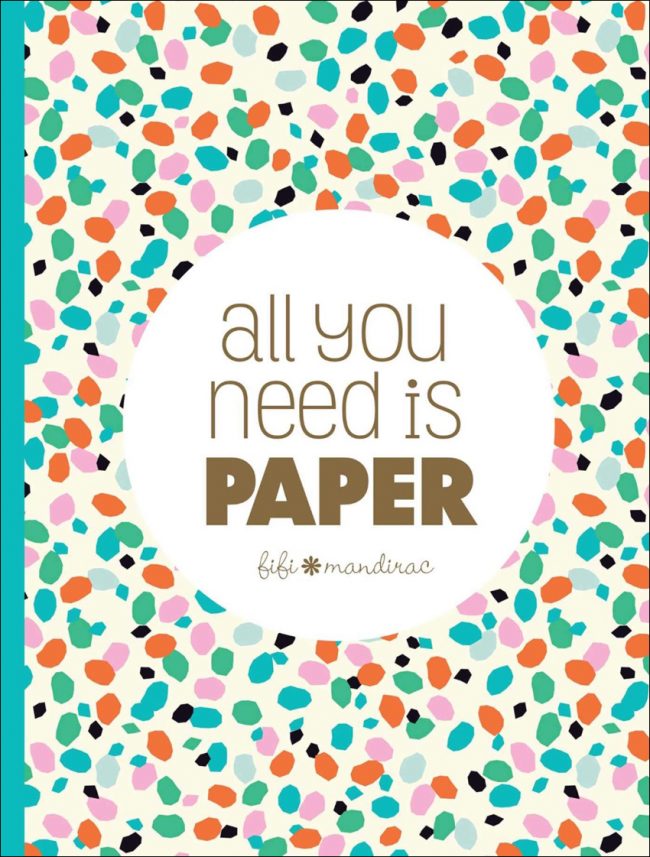
Artists around the globe are in suspended animation. Whether they're quarantined alone, with friends or in a family, these are unforeseen conditions. In France, you can only go out for groceries, to briefly walk a pet or visit the pharmacy. Curious about what this challenge might be changing, I asked a few French creators how they're doing. We didn't talk about the big issues; just the small, daily acts of life and work.
Based in Marseilles, artist Fifi Mandirac works in paper: everything from postcards to books bears her drawings. Although her career has paralleled the shift to digital, her art retains the things that brought it prominence: it's colorful, optimistic and always fresh. Born in Paris, Fifi studied at the Ecole Penninghen, whose alumnae include Matisse, Duchamp, Rauschenberg, Eileen Gray and Fritz Lang. After graduation, she held three big-league jobs in commercial design. But that was not, she decided, the world for her. She binned her portfolio to make cards and papers sold in a friend's boutique. She printed, assembled and shipped these herself. "Every night, while I watched television, I packaged orders."
By 2001, she had her own company. Fifi's actual name is Stéphanie Le Rouzic but her nom d'art embodies family histories. "'Fifi' came via my paternal grandmother, who always called our family 'Les Fifi'. She meant me, my parents, my brothers and my sister, but she would always say, Oh, Les Fifi are coming over... It helped her separate us from my uncle's family."
"Mandirac" was the maiden name of her mother's mother. "I always loved the way it seems to end in a clap! Also, it reminded me of 'Mandrake the Magician'… so even if I wasn't born Fifi Mandirac, it's a name that's totally, entirely me."

As the Internet flourished, so did FiFi's brand. In 2007, she began a blog called Les Surprises ("Surprises"). Vibrant and inventive, Les Surprises became a hit that brought in fans from Tokyo to India. All its art was driven by Fifi's love of paper and play. "Even as a child I was always making cards, comics, little books and costumes. I was always decorating. All that ever changed was… I got bigger."
Still designing paper, notebooks and offbeat offerings (parents made her labels for "Anti-Monster Water" a best-seller), Fifi moved into books. Some are for children, others aim at artists. In May of 2018, she published La Bible de Papier or "The Bible of Paper" and, last year, All You Need is Papier.
As All You Need is Paper, this is now in English and, for quarantined creators, it's a perfect book- of-the-moment. With 230 separately-designed pages, all detachable, it needs just one ingredient: ingenuity. It gives you all the makings for fanzines, postcards, envelopes and gifts.
The project took Fifi a decade. "I'd always wanted to create a book for people like me, everyone who really loves paper and design. Whether it's an image, a drawing or a sticker, the idea was just to offer raw materials. There are a few actual models you can make, how-to projects with tips. But what I wanted was to stimulate creation."

The book's English version launched with a hashtag: #allyouneedispaper. "When all the crazy panic-buying started – all that toilet paper – that feed was bursting with things I never could have imagined."
What are the outlines of your world at the moment ? How are you situated?
After many years in Paris, three-and-a-half years back we moved to Marseille. Here our apartment is right in the city centre, just ten minutes from the Vieux Port – the harbor. I have two children; Susie, thirteen, and Charlie, nine. We're very lucky in that we have a sunny terrace. Since we're in the centre, I'm also close to friends who are freelance. But now there's no meeting up for lunches or breaks.
The move to Marseille modified how I work, because I no longer have a studio. In Paris, I had my own atelier and employees. When I left, of course, I couldn't take them with me. So I decided to stop selling through distributors. Now, I focus more on creating and making books.

For three years now I've worked on our kitchen table, right in the heart of the house. This means that when the kids come home from school, things have to change. They know my day's not over so they try not to disturb me. But even if it's only one of them each half-hour, that makes four interruptions every sixty minutes. I was just answering an email, for instance. But I had to stop and hear a poem recited, I had to explain the expression "focus group" and I corrected an exercise in math...While I've gotten accustomed to this, it can't go on.
So… There's a small structure out on our terrace and I'm going to turn it into a studio. But the works for that were due to start next month.
What are your most basic work requirements?
People are surprised when I tell them I work on a portable Mac using just the trackpad. But I had difficulty having both my children, so I had to spend many months horizontally. Since I couldn't breathe just lying down, I would often end up lying on my side. Thanks to my laptop, I could keep on working – but without the mouse I was used to using. Afterwards, I could have gone back to my old habits but, in fact, the new system was a comfort. I found I could work the same way everywhere, whether I was on vacation, in the bed or on a train.
I only recently realized it, but my graphic style is linked to those very constraints. All my lines are simple and I don't draw in great detail. I also spend a lot time watching my nine-year-old. While Charlie draws a lot, he doesn't aim to make it pretty – he's always drawing to tell or say something. Before he starts, unlike me, he doesn't pose lots of questions. Sometimes he gets really involved trying to depict something that would seem impossible. Yet, by the end, what he's done is very clear. I admire his freedom and I've also learned from it.

Independent artists are used to solitude. But, when you're barred from being out among people and even nature, those parameters change. How are you dealing with it?
We're only in the second week. So I can't say I've felt the confinement too much. Still, we're now starting to get beautiful weather. While we can still eat on the terrace, giving up our walks to the sea, giving up swimming and bathing – that's going to be much harder.
It's made me realize, more than ever before, how much you need to feel good in your space. I've always had that drive to build my own nest and inhabit where I am in the deepest sense. It's no coincidence that, only last year, I started to consult on interiors. Right now I'm lucky because what's around inspires me and it's rich in what I've brought back from outside. Part of that is actual books and objects and souvenirs. But it's also art: papers I've designed, posters, postcards and so on.
Right now, however, that kind of external contribution is just virtual. Which is disturbing because there's no longer any hierarchy to what I see. Everything may be visible, but it's all now far away. It gives me a real wish to tap what's inside my head and find out just what's accumulated there. I want to cut myself off even more, use the time to look for inspiration deep inside…become more instinctive. We expect the quarantine to last at least several weeks. But I think it takes that long for things to really incubate.
Besides your new studio, do you have other projects or commissions that are in limbo?
I was about to start a new book but, like All You Need is Paper, it's quite complex. So, because of costs, it can't be printed outside China. We were waiting for the end of the Chinese New Year. But then the virus arrived so, for now, it's on hold. I'm hoping it's just postponed because it's so close to my heart. But I don't really know. There's another book I finished in December, which is now – theoretically – due in May. Financially, of course, none of this is good news. But I'm going to use the time for personal research.

As both a mother and the manager of your brand, I know you're disciplined. But do you notice psychological changes – to your rhythms, maybe, or your way of working?
I'm aware that this is going to take a long time. So I started out by trying to clear the decks. I wanted to get rid of all my administration: sort out the invoices, put accounts in order … I didn't want excuses for not diving into work.
I'm asking myself a lot of questions, too, about the consequences for my work. Will projects continue to happen? Will people still have money to spend on something that's not a basic necessity? I've heard people talk about aid and compensation. But as an independent, I don't have illusions, I know I won't have the right to anything. I'm very fortunate to own my apartment, so there won't be rent or credit to fear. Otherwise, I would be extraordinarily worried and that would certainly affect what I could make.
Have you encountered specific revelations or … real surprises?
What's surprised me most is how my kids adapted. They're able to let me work more or less normally and they can occupy themselves without recourse to screens… which was what I feared the most. They're drawing, writing, they're making films and taking photos. Basically, they just create. If I run out of inspiration, I'll know where to look for it!

Are there any logistical problems … are you at risk running out of inks or a certain paper?
Not really. Since I work at home, all the usual things are here. Of course I might have bought more paint or paper if I'd known. But I think I'll get by with what I have; any shortages will just force me to be inventive.
Have you improvised new work habits?
We're just trying to keep a regular rhythm. Even if it's only because they need regular meals, having a family gives your day structure. Normally, my children have their lunch at school – so until now I had longer working hours. One more thing has changed my pace, but that's less to do with confinement than the season. Instead of taking a walk, I use the terrace for breaks in the sun. I might even stop right in the middle of the day and just lose myself in a book. It's the first time I've ever done that. But, since we're not going out, I can always compensate in the evenings.
In a sense, every day is now a Wednesday. [On Wednesday afternoons, French children have no school]. But the awareness of that moment we're all living, of how strange it is… That's totally pervasive.

Certainly everyone is thinking about "communication ", whether it's through images or via texts and emails. At the same time, with so many people who would be in offices or studios at home – with families together 24/7 – all the virtual "networks" are flooded.
Everyone "communicates" like that as a way to keep themselves visible – it's a way of existing. While I understand that need, I don't really feel it. After those first frantic days of poring over the news (and nervous laughter at the unavoidable jokes), I'm using social media less than before. When all the talk is just quarantine and the virus, it doesn't really take your mind away from it.
How did you previously manage social media?
I don't really use social media; the only thing I follow is Instagram. Those networks stimulate me as much as they annoy me, in that it’s great to see so much creativity. But things circulate so fast I find it hard to appreciate. No sooner have I discovered the work of one artist than the work of someone else pops up in front of me. So it's hard to get an overall picture or get a real perspective on someone's work.
Much as I like to see creative results, I also like to understand how things happened. I like to know who the person is, where they come from…and I want to learn about their motivation. For me all that is as inspiring as the outcome. Too often, social media only shows that end result.
I'm seeing a lot of creative initiatives and "challenges". That's all fine but I don't want to put myself under that pressure, trying to respond to outside demands. The whole quarantine is such an unheard-of experience, I want to try and make it an opportunity. For me, that's letting what's inside me percolate. At least in this early stage, I prefer to keep that and happens at home for myself.

More than ever, it's a moment that fuses what we do with how we live.
As with any real crisis, there's still opportunity. For me, the most precious aspect of that is time. I’ve always fantasized about the world stopping – so I could do all those things I "never have time for". Then voilà, suddenly it happened. In terms both little and large, I very much hope that something beautiful can emerge out of all this. Also, confined as we are, we are just so, so lucky. Even to think about creating is a luxury. My thoughts go out all of those who still get up, going to work amidst it all – and work harder than ever before.

- All You Need Is Paper by Fifi Mandirac is available from Thunder Bay Press/Simon & Schuster; Fifi's e-shop also ships worldwide






